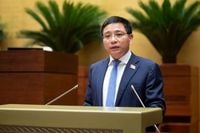On May 9, 2025, Prime Minister Pham Minh Chinh chaired a pivotal Government meeting focused on reorganizing administrative units across all levels and establishing a two-tier local government model. The meeting gathered key figures, including Deputy Prime Ministers Nguyen Hoa Binh, Tran Hong Ha, Le Thanh Long, Ho Duc Phoc, and Mai Van Chinh, along with various ministers and leaders from governmental agencies.
Prime Minister Chinh emphasized the necessity of executing a "revolution" in organizational structure. He noted that central ministries and agencies have largely completed their internal restructuring and are now actively working on reorganizing administrative units at all levels and developing a two-level local government model. Following this reorganization, the country is projected to have 34 provinces and cities directly under the Central Government, along with an estimated 3,193 commune-level administrative units.
During the session, the Prime Minister commended localities that have diligently engaged in the restructuring process and solicited public input regarding the adjustments to administrative units. He stated that the Government’s proposals need to be refined based on feedback, which will then be submitted to the National Assembly for approval.
Chinh highlighted that once the National Assembly approves the proposals, the Government aims to implement the new administrative structure by July 1, 2025. He stressed the importance of maintaining continuous operations without interruptions, particularly concerning administrative procedures that impact citizens and businesses.
The Government's Steering Committee is tasked with preparing the necessary documentation for the National Assembly and ensuring that all steps comply with existing regulations. The Prime Minister underscored the urgency of creating a framework for the new local government model, which includes defining the decentralization of powers between central and local authorities.
In a related context, Minister of Home Affairs Pham Thi Thanh Tra reported on the outcomes of the restructuring initiative. Based on Resolution No. 60-NQ/TW from the 11th Central Conference, the Ministry has evaluated 23 project proposals from provinces and cities aiming to arrange 52 provincial-level administrative units. The Ministry has compiled these into a comprehensive Government project for administrative reorganization.
The draft project identifies four cities—Hai Phong, Ho Chi Minh City, Da Nang, and Can Tho—and 48 provinces that will undergo reorganization. Notably, 11 provincial-level units will not be restructured, including major cities like Hanoi and Hue, which meet the established criteria.
After the reorganization, Ho Chi Minh City is set to have a population exceeding 14 million. The Ministry of Home Affairs confirmed that all 23 newly formed provincial-level units will meet the standards outlined in the relevant regulations. The public response has been overwhelmingly positive, with an average approval rate of 96.19% across the country.
Furthermore, during the same session, Minister of Finance Nguyen Van Thang presented a Draft Law to amend the Planning Law to the National Assembly. He noted that the arrangement of administrative units will significantly influence the national planning system. As such, it is crucial to reassess and adjust the planning framework in light of the new administrative structure.
The draft law aims to simplify procedures for adjusting planning documents for the period 2021-2030, aligning them with the new administrative units. This includes proposals to decentralize authority from the Prime Minister to local governments, allowing them to adjust provincial planning following mergers.
Moreover, the draft law seeks to delegate the authority for national marine spatial planning and national land use planning to the Government, as well as determining regions requiring planning. This decentralization is intended to enhance the responsiveness and effectiveness of governance at all levels.
The National Assembly is scheduled to discuss the Draft Law in groups on May 10, 2025, with a full session planned for May 28, 2025, before a vote is expected on June 25, 2025.
As Vietnam embarks on this administrative restructuring, the focus remains on fostering efficient governance and ensuring that the public administration is responsive to the needs of its citizens. The Government's commitment to maintaining an uninterrupted workflow during this transition will be crucial for sustaining public trust and confidence.
The ongoing efforts to reorganize administrative units reflect a significant shift in Vietnam's governance model, aiming to streamline operations and enhance the effectiveness of local governments. With the backing of both the National Assembly and the public, these initiatives are poised to reshape the administrative landscape of the nation.





